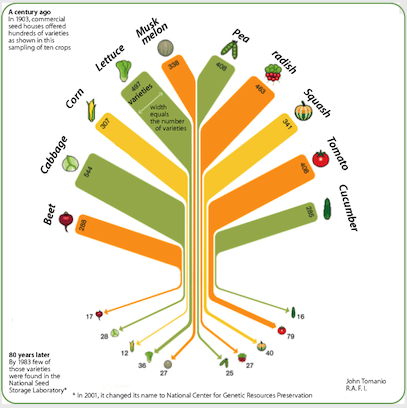1- Taste
The primary reason to choose heirloom fruit is taste. On that point the difference is often remarkable… Heirloom seeds are invariably selected in each generation from the best tasting parent. This why the exterior appearance of heirlooms is often imperfect when compared to hybridized fruit. This practice of growing and saving selected seeds to be passed on generationally to family, community and traders the world over has been done for millennia.
2- Open pollination
Open pollination is produced with the help of pollinators; bees, humans, wind and other natural mechanisms. Because there are no restrictions in the circulation of pollen between individuals, we benefit from a greater genetic diversity. This leads to a greater variety of plants which results in permitting them to adapt to local conditions for growth and climate. Therefore, the survival of the diversity of seeds is assured for generations to come by keeping them in the public domain.
On the other hand, hybrid seeds are beneficial mostly as monocrops. It seems the goal of the corporate produced hybrid is to sever the seed’s relationship to the natural world, and profit from a short term economic model. Proprietary control schemes such as hybrids (F1), patenting, PVP, and trademarking are stifling resilient innovation and diversity. Proprietary hybrids are the single biggest contributor to the erosion of agricultural biodiversity regionally and worldwide. Open pollination encourages diversity and resilience. It is akin to open source. Unlike hybrids, open pollinated varieties become adapted to the area in which they are grown and have been shown to outperform imported seed. If we are to approach true food freedom, it must rest on a foundation of open pollination.
We started to manually pollinate our squash 2 years ago in order to augment its horizontal resistance. The purpose of which is to “acclimate” our landraces to our climate and further build its natural defences against pathogens and pests. Multiple criteria go into selecting which plant we pollinate. Taste is front and center…

3- Biodiversity
Hybridization of seeds is such a popular business model, it puts at risk the overall biodiversity of agriculture. Many seed varieties have come extinct or are about to become extinct. Today, experts estimate 75% of seeds have disappeared!
Another little fact: about 65% of all commercial seeds (the ones that are left) belong to 4 companies: Mosanto/Bayer, Dupont/Pioneer, Syngenta & Vilmorin. And, more and more, these seeds are “prisoner” of their agro-chemical bond. It is imperative that we look to end these schemes where the sustainability of seeds is at stake. All seeds should come back to the public domain.
